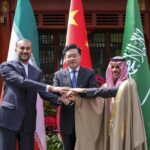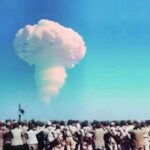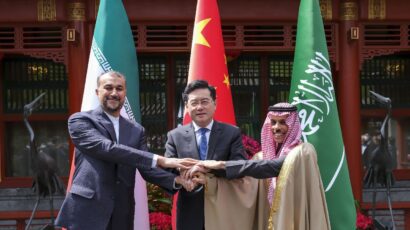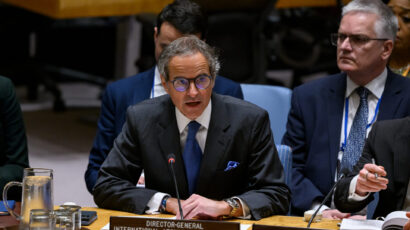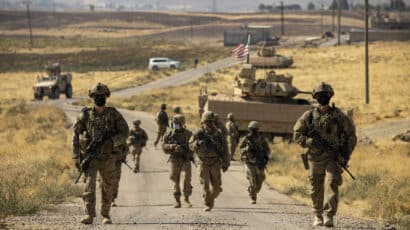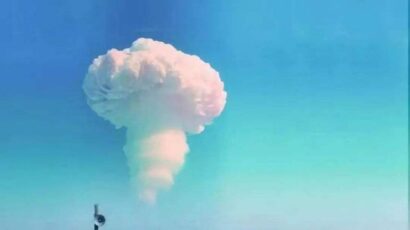Reducing the role of nuclear weapons
By Joshua Pollack | October 30, 2009
In his April 5, 2009 speech in Prague, President Barack Obama pledged to “take concrete steps toward a world without nuclear weapons.” In particular, he promised to “reduce the role of nuclear weapons in our national security strategy, and urge others to do the same.” This was not merely an idealistic gesture. Bounding the role of the U.S. strategic nuclear arsenal will be essential to the administration’s efforts to strengthen the nuclear nonproliferation regime.
The most straightforward expression of a U.S. nuclear defensive policy–pure deterrence, with no element of coercion–would be ‘no-first-use’ guidance, deciding that nuclear weapons are only to be used in response to nuclear attack against the United States, its allies, or its forward-deployed forces.”
In principle, the Bush administration also sought to reduce U.S. reliance on nuclear weapons. Nevertheless, the 2001 Nuclear Posture Review found nuclear deterrence to be broadly applicable to a range of threats, including “large-scale conventional military force.” Moreover, the review, whose list of potential adversaries included several without known nuclear arsenals, concluded that the “unique properties” of nuclear forces could enable the United States to “hold at risk classes of targets important to achieve strategic and political objectives.” This ambiguous formula was just as suggestive of coercion as of deterrence. The Bush administration also struggled to persuade other countries to follow its lead on nonproliferation, as evidenced by the failure of the 2005 Nuclear Non-Proliferation Treaty (NPT) Review Conference.
This outcome wasn’t entirely coincidental.
How Americans conceive the role of nuclear weapons illuminates the role of nonproliferation in the eyes of a skeptical world. If Washington considers its nuclear arsenal suitable for coercing potential adversaries, then stopping the spread of nuclear weapons becomes an adjunct to the already considerable power of the United States. If, on the other hand, nuclear weapons come to play a strictly defensive role for the United States and its allies, then nonproliferation can be more readily appreciated as broadly in the common interest of humanity.
Given the prominence of the United States in the international system, the role of U.S. nuclear weapons will strongly influence the Obama administration’s chances of finding support for strengthened nonproliferation measures at the May 2010 NPT Review Conference in New York. If U.S. nuclear weapons are flaunted as instruments of coercion and emblems of might, then the states that have failed to observe the NPT’s rules–North Korea and Iran–are likely to receive more sympathy from the “non-aligned” camp than otherwise would be the case. Their illicit activities will seem like natural responses to an overweening superpower that behaves as if it were a dissatisfied actor.
But if it is known that U.S. nuclear weapons exist only for deterrence, then the U.S. case stands to receive the more understanding reception. Less is likely to be made of the failure of the recognized nuclear weapon states to move rapidly toward disarmament. As the de facto guarantor of security, prosperity, and the status quo across a globe-spanning network of alliances, the United States in particular could not be expected to drop its defenses while potential adversaries are seeking nuclear weapon capabilities of their own.
The Obama administration’s own Nuclear Posture Review, to be delivered before the NPT Review Conference, offers a timely opportunity to deliver on the president’s promise to constrain the role of U.S. nuclear forces. The fulfillment of that pledge cannot rest too much on actual changes in force structure, since bureaucratic and political realities always weigh heavily upon formal review processes. (The inertia is compounded by the timing of U.S.-Russian nuclear diplomacy, which is currently focused on renewal of arms control mechanisms rather than seeking profound shifts in force posture.) Instead, the administration can alter the role of nuclear weapons by issuing a clear and authoritative definition of their purposes. We shouldn’t consider this step merely a matter of “declaratory policy,” as if it were solely for external consumption; rather, it should be taken as a basic choice of defense policy, the point of departure for future guidance to planners.
Naturally, the most straightforward expression of a defensive policy–pure deterrence, with no element of coercion–would be “no-first-use” guidance, deciding that nuclear weapons are only to be used in response to nuclear attack against the United States, its allies, or its forward-deployed forces. The United States refrained from making no-first-use pledges during the Cold War because of the need to counteract Soviet conventional superiority. Subsequently, it adopted a policy of “calculated ambiguity,” explained by the need to deter chemical or biological attacks with nuclear weapons. Despite the implausibility of such a disproportionate retaliatory threat, this concern remains the primary obstacle to a nuclear no-first-use policy. Even so, it does not prevent a deterrence-only policy.
If the Obama administration determines that conventional forces and defensive systems suffice to deter or neutralize chemical or biological attack, then it can readily adopt a nuclear no-first-use policy. Or, if the administration determines that nuclear weapons should continue to play a role in deterring chemical or biological attack–notwithstanding their lack of credibility for this purpose–then it can take the advocates of calculated ambiguity at their word, establishing a policy of no first use of weapons of mass destruction. The appropriate statement could be issued as an Executive Order, giving it the force of policy.
Either nuclear no-first-use or the second-best alternative will face opposition from advocates of traditionalism in nuclear strategy, which prizes flexibility over all other considerations. But neither idea would face insurmountable obstacles. Certainly, if the role of nuclear weapons cannot be constrained by issuing an authoritative policy statement, then seemingly very little can be achieved in this area at all.
Together, we make the world safer.
The Bulletin elevates expert voices above the noise. But as an independent nonprofit organization, our operations depend on the support of readers like you. Help us continue to deliver quality journalism that holds leaders accountable. Your support of our work at any level is important. In return, we promise our coverage will be understandable, influential, vigilant, solution-oriented, and fair-minded. Together we can make a difference.
Topics: Columnists, Nuclear Weapons




